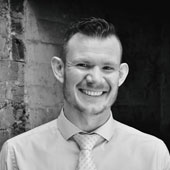
Private: Tim Davies
Former
Tim oversees Research Facilitation in the department, and supports the growth and development of OII research activity and strategy.
Thain came to the OII after a year working at Yahoo in California. After finishing his undergraduate degree at Santa Clara University, where he studied Finance, he began at Yahoo as a Financial Analyst focusing on advertising metrics, as part of team tasked with building a new platform for reporting and analyzing data about our audience, traffic, and advertising revenues. Interview with Tim Davies.
Tim: What first attracted you about the OII?
Thain: During my undergraduate degree, I wrote my honors thesis on the role of social media in the Egyptian Protests of 2011. The project introduced me to the idea of studying the social, cultural, and political impact of the Internet. Knowing that I wanted to go to graduate school at some point, I looked for masters programs that would allow me to study in this area. Although I knew I wanted to study the Internet, I wasn’t sure exactly what to focus on at that point. The OII offered the flexibility to explore different areas of interest in an interdisciplinary environment. I was attracted to this flexibility and the opportunity to study at Oxford with fantastic professors and fellow students.
Tim: What was your main focus of interest at the OII?
Thain: I wrote my dissertation on Coursera, one of the leading platforms for massive open online education. MOOCs, as they’re known, were just gaining attention in late 2012 and there was very little research available about their efficacy. Given my finance background, I was interested in the financial sustainability of MOOCs. I realized that although MOOCs would ultimately have to charge their students, either directly or indirectly, most research and commentary on MOOCs studied free courses.
Using data from a Coursera course offered by the University of Pennsylvania, I studied the differences in student engagement, persistence, and performance between students taking the course for free and those enrolled in Signature Track, a program that provides additional verification and other services to students for a fee. I was able to demonstrate significant differences in student behavior among students who have paid for the course. Although largely omitted from the public debate, these differences are particularly relevant as MOOCs become increasingly embedded within existing educational institutions where students pay to access the material through their tuition.
Tim: Where has life taken you since the OII?
Thain: I recently joined a startup in San Francisco called Rise. We’re building a micro-coaching platform that connects clients with professional nutritionists through their smartphone, all while making the experience more personal, mobile, and efficient. In doing so, we’ll be able to make a highly effective method for losing weight—personal nutrition coaching—affordable for millions of people who need it.
My primary role is in product analytics. I’m responsible for collecting and analyzing the data generated by our app and using it to improve our product. It’s a small team, so I also help out with customer acquisition and whatever else needs to get done. We’re getting close to launching the product and I’m enjoying the ride so far.
Tim: Did your time at the OII prepare you for this role?
Thain: Definitely. My role in analytics requires a substantial degree of programming, mostly in Python. I didn’t really have any programming experience before coming to the OII, but I learned quickly through projects in Digital Social Research (one of the option courses) and for my dissertation. Perhaps even more importantly, my studies at the OII forced me to think critically and analytically about how research questions can be tackled using data. Working in analytics, I draw on this experience every day.
Tim: What job-hunting advice would you would give our students?
Thain: Reach out to people you know. When I was job hunting after graduating from the OII, all of my best leads and interviews came from introductions made by friends and former colleagues. I think it’s also important to be focused. Take some time to find out what you want to be doing and where you might want to work before you start looking. Studying for a year at the OII gave me a chance to think about what I wanted to do and ultimately approach my job search with more clarity.
Tim: What do you miss most about Oxford?
Thain: The people and the place. I met the most amazing people during my year at Oxford. Both at the OII and at my college (Green Templeton), I came to know some incredibly intelligent people who have a real passion for what they do. There’s also something special about the city itself. There’s so much history there—each and every building has a story to tell. And for a season-deprived Californian, the English autumn and spring were a treat.
Tim: And finally, where do you see yourself in five years?
I’m interested in using technology and data to solve important problems. Health and nutrition is one such area, and I enjoy the work I’m doing at Rise. There’s a lifetime of important problems out there and I expect to work on a number of them over the course of my career. The important thing for me is working with great people on projects that have a positive impact.